The Cambridge History of China. Vol. 13: Republican China 1912-1949, Part 2
Подождите немного. Документ загружается.

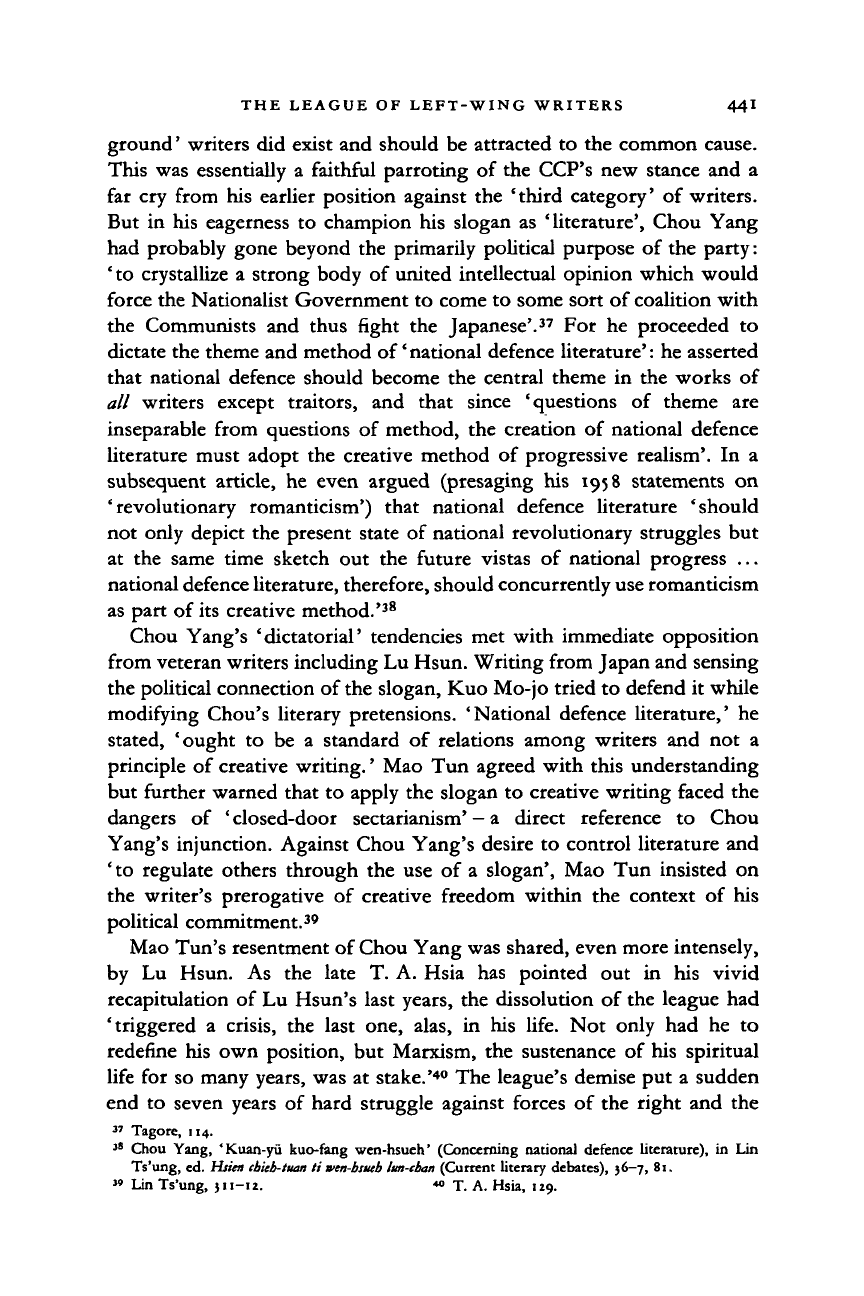
THE LEAGUE OF LEFT-WING WRITERS 441
ground' writers did exist and should be attracted to the common cause.
This was essentially a faithful parroting of the CCP's new stance and a
far cry from his earlier position against the 'third category' of writers.
But in his eagerness to champion his slogan as 'literature', Chou Yang
had probably gone beyond the primarily political purpose of the party:
' to crystallize a strong body of united intellectual opinion which would
force the Nationalist Government to come to some sort of coalition with
the Communists and thus fight the Japanese'.
37
For he proceeded to
dictate the theme and method of' national defence literature': he asserted
that national defence should become the central theme in the works of
all writers except traitors, and that since 'questions of theme are
inseparable from questions of method, the creation of national defence
literature must adopt the creative method of progressive realism'. In a
subsequent article, he even argued (presaging his 1958 statements on
'revolutionary romanticism') that national defence literature 'should
not only depict the present state of national revolutionary struggles but
at the same time sketch out the future vistas of national progress ...
national defence literature, therefore, should concurrently use romanticism
as part of its creative method.'
38
Chou Yang's 'dictatorial' tendencies met with immediate opposition
from veteran writers including Lu Hsun. Writing from Japan and sensing
the political connection of the slogan, Kuo Mo-jo tried to defend it while
modifying Chou's literary pretensions. 'National defence literature,' he
stated, 'ought to be a standard of relations among writers and not a
principle of creative writing.' Mao Tun agreed with this understanding
but further warned that to apply the slogan to creative writing faced the
dangers of ' closed-door sectarianism'
—
a direct reference to Chou
Yang's injunction. Against Chou Yang's desire to control literature and
' to regulate others through the use of a slogan', Mao Tun insisted on
the writer's prerogative of creative freedom within the context of his
political commitment.
39
Mao Tun's resentment of Chou Yang was shared, even more intensely,
by Lu Hsun. As the late T. A. Hsia has pointed out in his vivid
recapitulation of Lu Hsun's last years, the dissolution of the league had
'triggered a crisis, the last one, alas, in his life. Not only had he to
redefine his own position, but Marxism, the sustenance of his spiritual
life for so many years, was at stake.'
40
The league's demise put a sudden
end to seven years of hard struggle against forces of the right and the
37
Tagore, 114.
38
Chou Yang, 'Kuan-yu kuo-fang wen-hsueh' (Concerning national defence literature),
in Lin
Ts'ung, ed. Hsiai chub-tuan
ti
wm-bsueb lun-tban (Current literary debates), 36-7, 81.
» Lin Ts'ung, 311-12.
« T. A.
Hsia,
129.
Cambridge Histories Online © Cambridge University Press, 2008
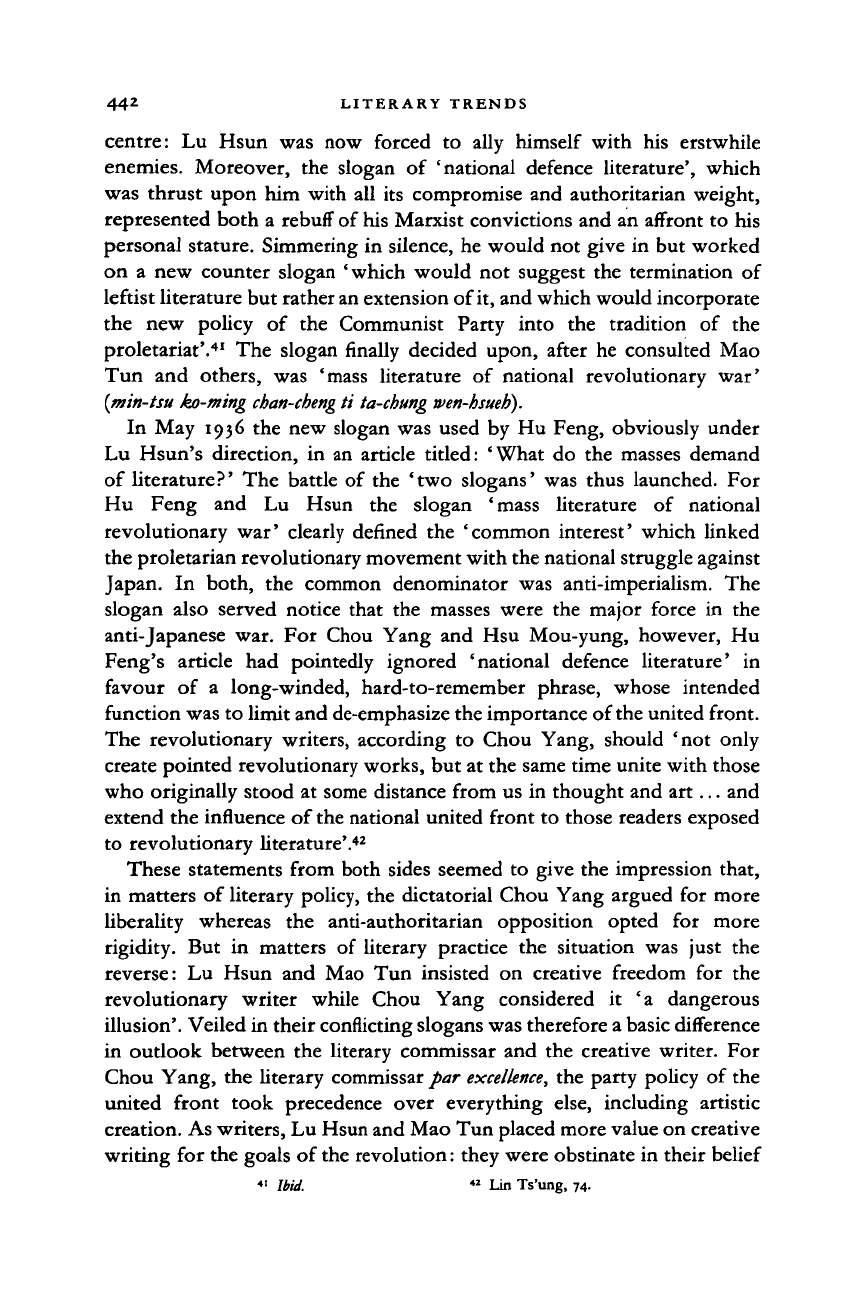
44
2
LITERARY TRENDS
centre: Lu Hsun was now forced to ally himself with his erstwhile
enemies. Moreover, the slogan of 'national defence literature', which
was thrust upon him with all its compromise and authoritarian weight,
represented both a rebuff of his Marxist convictions and an affront to his
personal stature. Simmering in silence, he would not give in but worked
on a new counter slogan 'which would not suggest the termination of
leftist literature but rather an extension of it, and which would incorporate
the new policy of the Communist Party into the tradition of the
proletariat'.
41
The slogan finally decided upon, after he consulted Mao
Tun and others, was 'mass literature of national revolutionary war'
(min-tsu ko-ming
chan-cheng
ti
ta-cbung
wen-hsueh).
In May 1936 the new slogan was used by Hu Feng, obviously under
Lu Hsun's direction, in an article titled: 'What do the masses demand
of literature?' The battle of the 'two slogans' was thus launched. For
Hu Feng and Lu Hsun the slogan 'mass literature of national
revolutionary war' clearly defined the 'common interest' which linked
the proletarian revolutionary movement with the national struggle against
Japan. In both, the common denominator was anti-imperialism. The
slogan also served notice that the masses were the major force in the
anti-Japanese war. For Chou Yang and Hsu Mou-yung, however, Hu
Feng's article had pointedly ignored 'national defence literature' in
favour of a long-winded, hard-to-remember phrase, whose intended
function was to limit and de-emphasize the importance of the united front.
The revolutionary writers, according to Chou Yang, should 'not only
create pointed revolutionary works, but at the same time unite with those
who originally stood at some distance from us in thought and art... and
extend the influence of the national united front to those readers exposed
to revolutionary literature'.
42
These statements from both sides seemed to give the impression that,
in matters of literary policy, the dictatorial Chou Yang argued for more
liberality whereas the anti-authoritarian opposition opted for more
rigidity. But in matters of literary practice the situation was just the
reverse: Lu Hsun and Mao Tun insisted on creative freedom for the
revolutionary writer while Chou Yang considered it 'a dangerous
illusion'. Veiled in their conflicting slogans was therefore a basic difference
in outlook between the literary commissar and the creative writer. For
Chou Yang, the literary commissar par
excellence,
the party policy of the
united front took precedence over everything else, including artistic
creation. As writers, Lu Hsun and Mao Tun placed more value on creative
writing for the goals of the revolution: they were obstinate in their belief
*'
Ibid.
« Lin Ts'ung, 74.
Cambridge Histories Online © Cambridge University Press, 2008
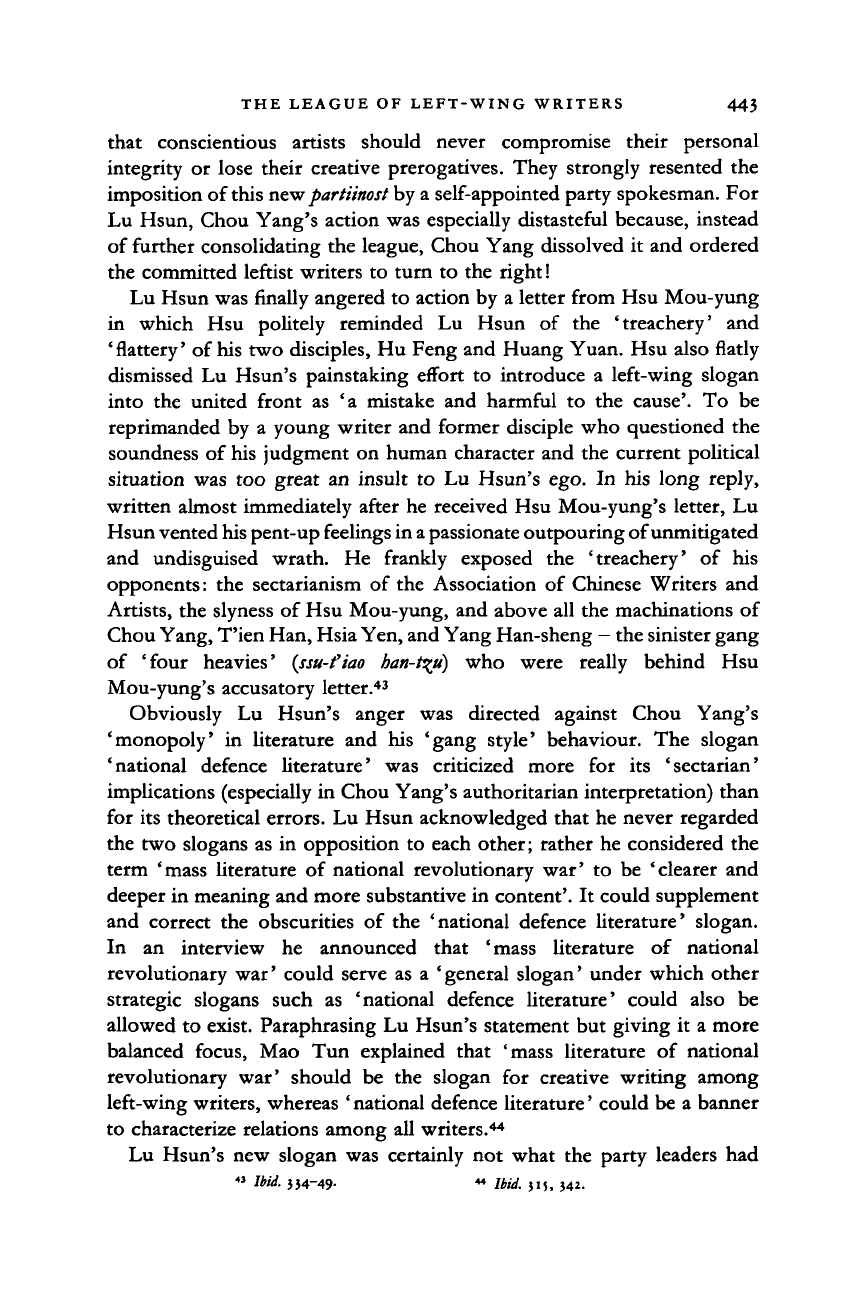
THE LEAGUE OF LEFT-WING WRITERS 443
that conscientious artists should never compromise their personal
integrity or lose their creative prerogatives. They strongly resented the
imposition of
this
new
partiinost
by a self-appointed party spokesman. For
Lu Hsun, Chou Yang's action was especially distasteful because, instead
of further consolidating the league, Chou Yang dissolved it and ordered
the committed leftist writers to turn to the right!
Lu Hsun was finally angered to action by a letter from Hsu Mou-yung
in which Hsu politely reminded Lu Hsun of the 'treachery' and
'flattery' of his two disciples, Hu Feng and Huang Yuan. Hsu also flatly
dismissed Lu Hsun's painstaking effort to introduce a left-wing slogan
into the united front as 'a mistake and harmful to the cause'. To be
reprimanded by a young writer and former disciple who questioned the
soundness of his judgment on human character and the current political
situation was too great an insult to Lu Hsun's ego. In his long reply,
written almost immediately after he received Hsu Mou-yung's letter, Lu
Hsun vented
his
pent-up feelings in
a
passionate outpouring of unmitigated
and undisguised wrath. He frankly exposed the 'treachery' of his
opponents: the sectarianism of the Association of Chinese Writers and
Artists, the slyness of Hsu Mou-yung, and above all the machinations of
Chou Yang, T'ien Han, Hsia Yen, and Yang Han-sheng - the sinister gang
of 'four heavies' (ssu-fiao han-tiyi) who were really behind Hsu
Mou-yung's accusatory letter.
43
Obviously Lu Hsun's anger was directed against Chou Yang's
'monopoly' in literature and his 'gang style' behaviour. The slogan
'national defence literature' was criticized more for its 'sectarian'
implications (especially in Chou Yang's authoritarian interpretation) than
for its theoretical errors. Lu Hsun acknowledged that he never regarded
the two slogans as in opposition to each other; rather he considered the
term 'mass literature of national revolutionary war' to be 'clearer and
deeper in meaning and more substantive in content'. It could supplement
and correct the obscurities of the 'national defence literature' slogan.
In an interview he announced that 'mass literature of national
revolutionary war' could serve as a 'general slogan' under which other
strategic slogans such as 'national defence literature' could also be
allowed to exist. Paraphrasing Lu Hsun's statement but giving it a more
balanced focus, Mao Tun explained that 'mass literature of national
revolutionary war' should be the slogan for creative writing among
left-wing writers, whereas 'national defence literature' could be a banner
to characterize relations among all writers.
44
Lu Hsun's new slogan was certainly not what the party leaders had
«
Ibid.
334-49. 4* /£*/. ,,,,
542
.
Cambridge Histories Online © Cambridge University Press, 2008
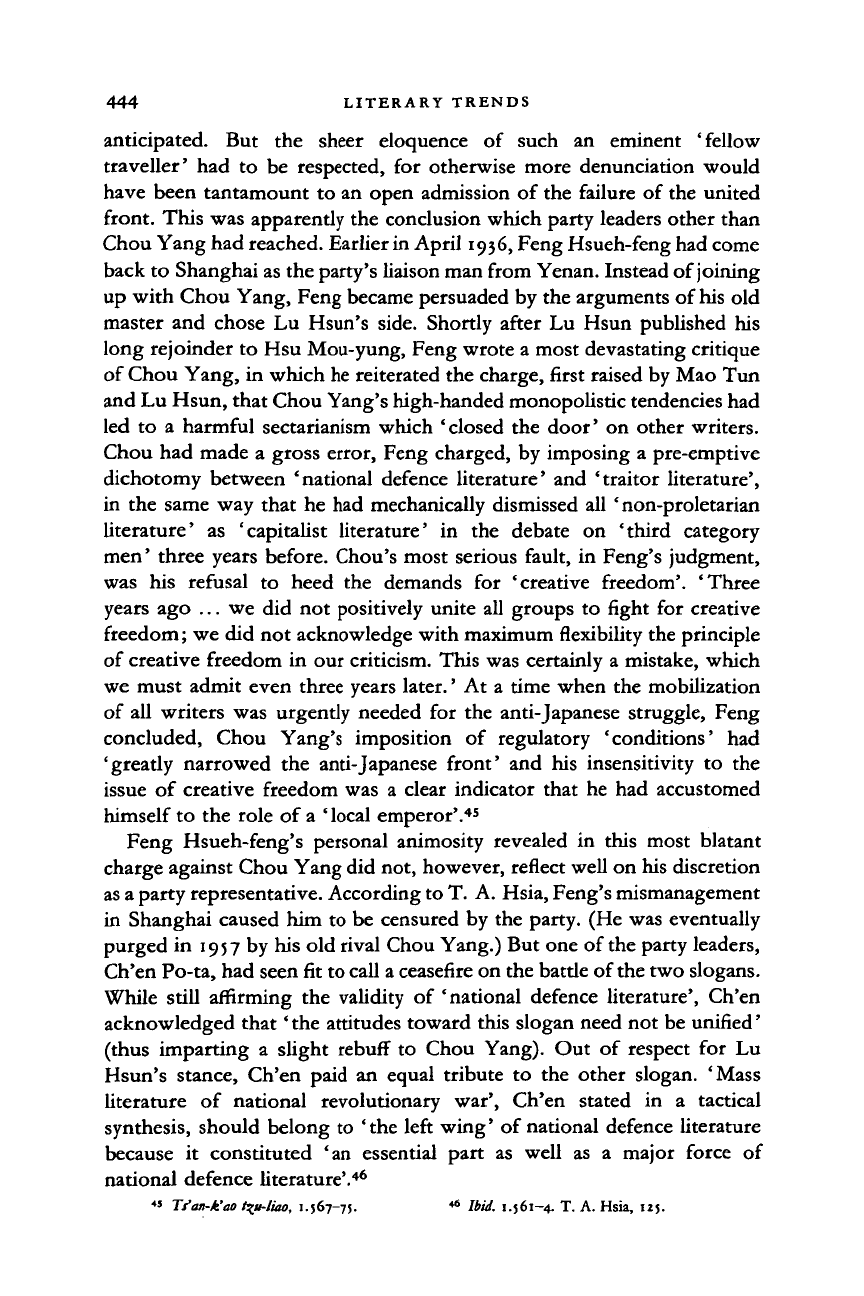
444 LITERARY TRENDS
anticipated.
But the
sheer eloquence
of
such
an
eminent 'fellow
traveller'
had to be
respected,
for
otherwise more denunciation would
have been tantamount
to an
open admission
of
the failure
of
the united
front. This was apparently the conclusion which party leaders other than
Chou Yang had reached. Earlier in April 1936, Feng Hsueh-feng had come
back
to
Shanghai as the party's liaison man from Yenan. Instead of joining
up with Chou Yang, Feng became persuaded by the arguments
of
his
old
master
and
chose
Lu
Hsun's side. Shortly after
Lu
Hsun published
his
long rejoinder
to
Hsu Mou-yung, Feng wrote
a
most devastating critique
of Chou Yang,
in
which he reiterated the charge, first raised by Mao Tun
and Lu Hsun, that Chou Yang's high-handed monopolistic tendencies had
led
to a
harmful sectarianism which 'closed
the
door'
on
other writers.
Chou
had
made
a
gross error, Feng charged,
by
imposing
a
pre-emptive
dichotomy between 'national defence literature'
and
'traitor literature',
in
the
same
way
that
he had
mechanically dismissed
all
'non-proletarian
literature'
as
'capitalist literature'
in the
debate
on
'third category
men' three years before. Chou's most serious fault,
in
Feng's judgment,
was
his
refusal
to
heed
the
demands
for
'creative freedom'. 'Three
years
ago ... we did not
positively unite
all
groups
to
fight
for
creative
freedom; we
did not
acknowledge with maximum flexibility the principle
of creative freedom
in our
criticism. This was certainly
a
mistake, which
we must admit even three years later.'
At a
time when
the
mobilization
of
all
writers
was
urgently needed
for the
anti-Japanese struggle, Feng
concluded, Chou Yang's imposition
of
regulatory 'conditions'
had
'greatly narrowed
the
and-Japanese front'
and his
insensitivity
to the
issue
of
creative freedom was
a
clear indicator that
he had
accustomed
himself to
the
role
of
a 'local emperor'.
45
Feng Hsueh-feng's personal animosity revealed
in
this most blatant
charge against Chou Yang did not, however, reflect well
on
his discretion
as a party representative. According to T.
A.
Hsia, Feng's mismanagement
in Shanghai caused
him to be
censured
by the
party. (He was eventually
purged
in
1957
by
his old rival Chou Yang.) But one
of
the party leaders,
Ch'en Po-ta, had seen
fit
to call a ceasefire
on
the battle
of
the two slogans.
While still affirming
the
validity
of
'national defence literature', Ch'en
acknowledged that
'the
attitudes toward this slogan need
not be
unified'
(thus imparting
a
slight rebuff
to
Chou Yang).
Out of
respect
for Lu
Hsun's stance, Ch'en paid
an
equal tribute
to the
other slogan. 'Mass
literature
of
national revolutionary
war',
Ch'en stated
in a
tactical
synthesis, should belong
to '
the left wing'
of
national defence literature
because
it
constituted
'an
essential part
as
well
as a
major force
of
national defence literature'.
46
*>
T/an-k'ao
t^u-liao,
1.567-75.
«*
Ibid. 1.561-4.
T. A.
Hsia, 125.
Cambridge Histories Online © Cambridge University Press, 2008
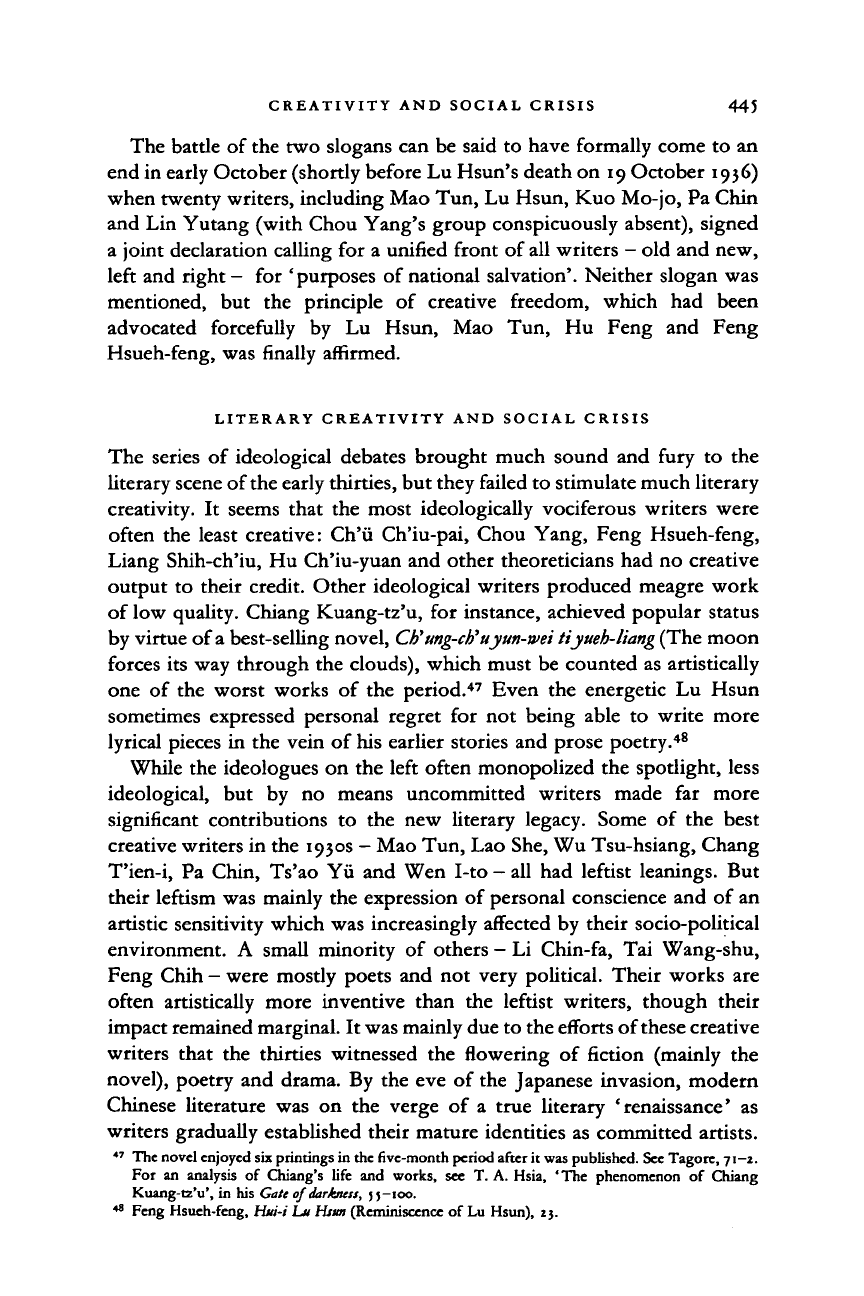
CREATIVITY AND SOCIAL CRISIS 445
The battle
of
the
two
slogans
can be
said
to
have formally come
to an
end in early October (shortly before Lu Hsun's death on
19
October 1936)
when twenty writers, including Mao Tun,
Lu
Hsun, Kuo Mo-jo, Pa Chin
and
Lin
Yutang (with Chou Yang's group conspicuously absent), signed
a joint declaration calling
for a
unified front
of
all writers
-
old
and
new,
left
and
right-
for
'purposes
of
national salvation'. Neither slogan
was
mentioned,
but the
principle
of
creative freedom, which
had
been
advocated forcefully
by Lu
Hsun,
Mao Tun, Hu
Feng
and
Feng
Hsueh-feng, was finally affirmed.
LITERARY CREATIVITY AND SOCIAL CRISIS
The series
of
ideological debates brought much sound
and
fury
to the
literary scene of the early thirties, but they failed to stimulate much literary
creativity.
It
seems that
the
most ideologically vociferous writers were
often
the
least creative: Ch'ii Ch'iu-pai, Chou Yang, Feng Hsueh-feng,
Liang Shih-ch'iu,
Hu
Ch'iu-yuan
and
other theoreticians
had no
creative
output
to
their credit. Other ideological writers produced meagre work
of low quality. Chiang Kuang-tz'u,
for
instance, achieved popular status
by virtue of a best-selling novel,
Ch'ung-ch'uyun-wei tiyueh-liang
(The moon
forces
its
way through
the
clouds), which must
be
counted
as
artistically
one
of the
worst works
of the
period.
47
Even
the
energetic
Lu
Hsun
sometimes expressed personal regret
for not
being able
to
write more
lyrical pieces
in the
vein
of
his earlier stories
and
prose poetry.
48
While
the
ideologues
on the
left often monopolized
the
spotlight, less
ideological,
but by no
means uncommitted writers made
far
more
significant contributions
to the new
literary legacy. Some
of the
best
creative writers
in
the 1930s
-
Mao Tun, Lao She, Wu Tsu-hsiang, Chang
T'ien-i,
Pa
Chin, Ts'ao
Yii and Wen
I-to
-
all
had
leftist leanings.
But
their leftism was mainly
the
expression
of
personal conscience
and of an
artistic sensitivity which was increasingly affected
by
their socio-political
environment.
A
small minority
of
others
- Li
Chin-fa,
Tai
Wang-shu,
Feng Chih
-
were mostly poets
and not
very political. Their works
are
often artistically more inventive than
the
leftist writers, though their
impact remained marginal.
It
was mainly due to the efforts of these creative
writers that
the
thirties witnessed
the
flowering
of
fiction (mainly
the
novel),
poetry
and
drama.
By the eve of
the Japanese invasion, modern
Chinese literature
was on the
verge
of a
true literary 'renaissance'
as
writers gradually established their mature identities
as
committed artists.
47
The novel enjoyed six printings in the five-month period after it was published. See Tagore, 71-2.
For
an
analysis
of
Chiang's life
and
works,
see
T. A.
Hsia,
'The
phenomenon
of
Chiang
Kuang-tz'u',
in
his Gate of darkness, j 5-100.
48
Feng Hsueh-feng, Hui-i
Lu
Hsun (Reminiscence
of
Lu Hsun),
25.
Cambridge Histories Online © Cambridge University Press, 2008
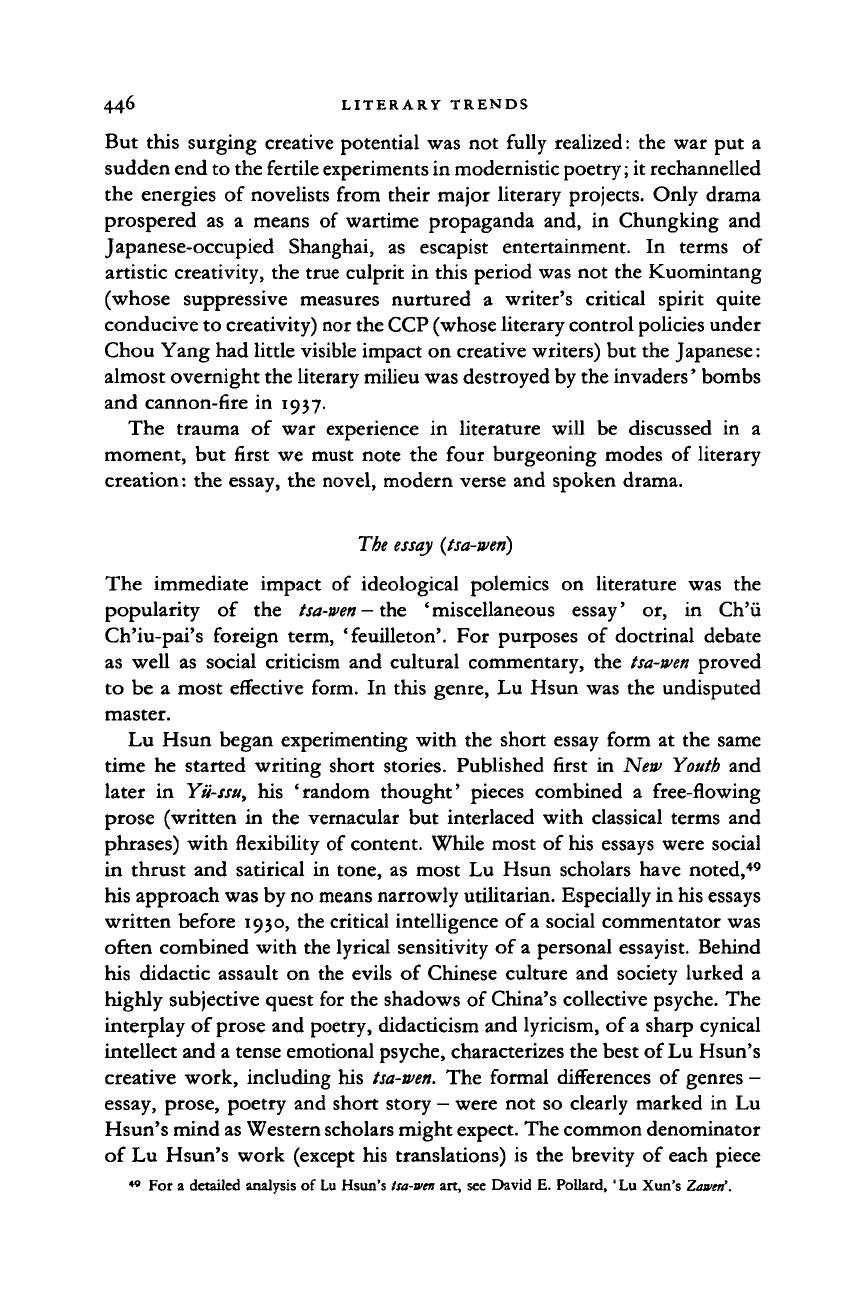
44^
LITERARY TRENDS
But this surging creative potential was not fully realized: the war put
a
sudden end to the fertile experiments in modernistic poetry; it rechannelled
the energies
of
novelists from their major literary projects. Only drama
prospered
as
a
means
of
wartime propaganda and,
in
Chungking and
Japanese-occupied Shanghai,
as
escapist entertainment.
In
terms
of
artistic creativity, the true culprit in this period was not the Kuomintang
(whose suppressive measures nurtured
a
writer's critical spirit quite
conducive to creativity) nor the CCP (whose literary control policies under
Chou Yang had little visible impact on creative writers) but the Japanese:
almost overnight the literary milieu was destroyed by the invaders' bombs
and cannon-fire in 1937.
The trauma
of
war experience
in
literature will
be
discussed
in a
moment, but first we must note the four burgeoning modes
of
literary
creation: the essay, the novel, modern verse and spoken drama.
The essay {tsa-weri)
The immediate impact
of
ideological polemics
on
literature was
the
popularity
of the
tsa-wen —
the ' miscellaneous essay'
or, in
Ch'ii
Ch'iu-pai's foreign term, 'feuilleton'. For purposes
of
doctrinal debate
as well
as
social criticism and cultural commentary, the
tsa-wen
proved
to be
a
most effective form. In this genre, Lu Hsun was the undisputed
master.
Lu Hsun began experimenting with the short essay form
at
the same
time he started writing short stories. Published first
in
New Youth and
later
in
Yu'-ssu,
his
'random thought' pieces combined
a
free-flowing
prose (written
in
the vernacular but interlaced with classical terms and
phrases) with flexibility of content. While most of his essays were social
in thrust and satirical in tone, as most Lu Hsun scholars have noted,
49
his approach was by no means narrowly utilitarian. Especially in his essays
written before 1930, the critical intelligence of a social commentator was
often combined with the lyrical sensitivity of a personal essayist. Behind
his didactic assault on the evils
of
Chinese culture and society lurked
a
highly subjective quest for the shadows of China's collective psyche. The
interplay of prose and poetry, didacticism and lyricism, of a sharp cynical
intellect and a tense emotional psyche, characterizes the best of Lu Hsun's
creative work, including his
tsa-wen.
The formal differences
of
genres
-
essay, prose, poetry and short story
-
were not so clearly marked in Lu
Hsun's mind as Western scholars might expect. The common denominator
of Lu Hsun's work (except his translations) is the brevity of each piece
40
For
a
detailed analysis
of
Lu Hsun's tsa-wen art, see David E. Pollard,
'
Lu Xun's Zaweri.
Cambridge Histories Online © Cambridge University Press, 2008
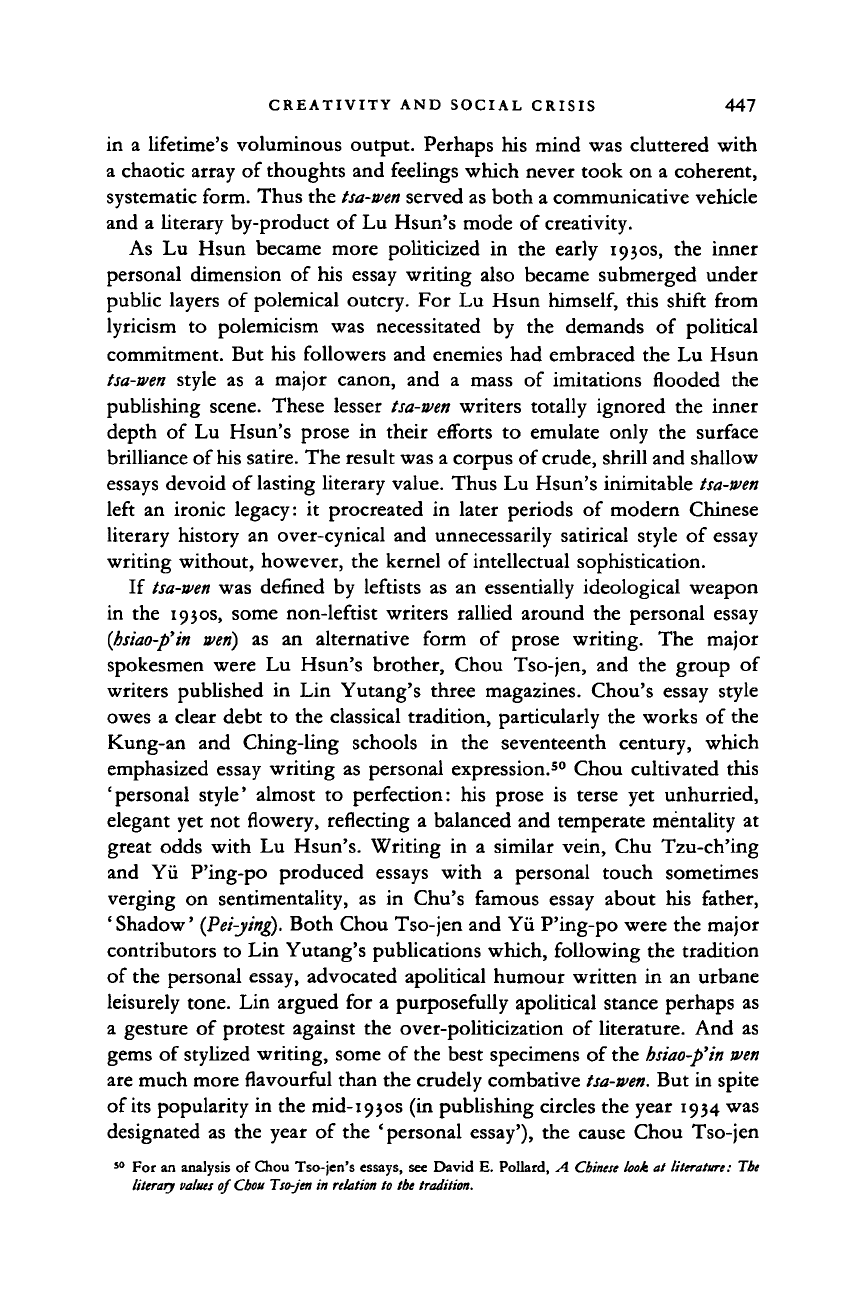
CREATIVITY AND SOCIAL CRISIS 447
in a lifetime's voluminous output. Perhaps his mind was cluttered with
a chaotic array of thoughts and feelings which never took on a coherent,
systematic form. Thus the
tsa-wen
served as both a communicative vehicle
and a literary by-product of Lu Hsun's mode of creativity.
As Lu Hsun became more politicized in the early 1930s, the inner
personal dimension of his essay writing also became submerged under
public layers of polemical outcry. For Lu Hsun
himself,
this shift from
lyricism to polemicism was necessitated by the demands of political
commitment. But his followers and enemies had embraced the Lu Hsun
tsa-wen
style as a major canon, and a mass of imitations flooded the
publishing scene. These lesser
tsa-wen
writers totally ignored the inner
depth of Lu Hsun's prose in their efforts to emulate only the surface
brilliance of
his
satire. The result was a corpus of
crude,
shrill and shallow
essays devoid of lasting literary value. Thus Lu Hsun's inimitable
tsa-wen
left an ironic legacy: it procreated in later periods of modern Chinese
literary history an over-cynical and unnecessarily satirical style of essay
writing without, however, the kernel of intellectual sophistication.
If
tsa-wen
was defined by leftists as an essentially ideological weapon
in the 1930s, some non-leftist writers rallied around the personal essay
{hsiao-p'in
wen) as an alternative form of prose writing. The major
spokesmen were Lu Hsun's brother, Chou Tso-jen, and the group of
writers published in Lin Yutang's three magazines. Chou's essay style
owes a clear debt to the classical tradition, particularly the works of the
Kung-an and Ching-ling schools in the seventeenth century, which
emphasized essay writing as personal expression.
50
Chou cultivated this
'personal style' almost to perfection: his prose is terse yet unhurried,
elegant yet not flowery, reflecting a balanced and temperate mentality at
great odds with Lu Hsun's. Writing in a similar vein, Chu Tzu-ch'ing
and Yu P'ing-po produced essays with a personal touch sometimes
verging on sentimentality, as in Chu's famous essay about his father,
'Shadow'
(Pei-jing).
Both Chou Tso-jen and Yu P'ing-po were the major
contributors to Lin Yutang's publications which, following the tradition
of the personal essay, advocated apolitical humour written in an urbane
leisurely tone. Lin argued for a purposefully apolitical stance perhaps as
a gesture of protest against the over-politicization of literature. And as
gems of stylized writing, some of the best specimens of the
hsiao-p'in wen
are much more flavourful than the crudely combative
tsa-wen.
But in spite
of
its
popularity in the mid-1930s (in publishing circles the year 1934 was
designated as the year of the 'personal essay'), the cause Chou Tso-jen
50
For an analysis of Chou Tso-jen's essays, see David E. Pollard, A Chinese look at literature: The
literary
values
of Cbou Tso-jen in relation to the tradition.
Cambridge Histories Online © Cambridge University Press, 2008
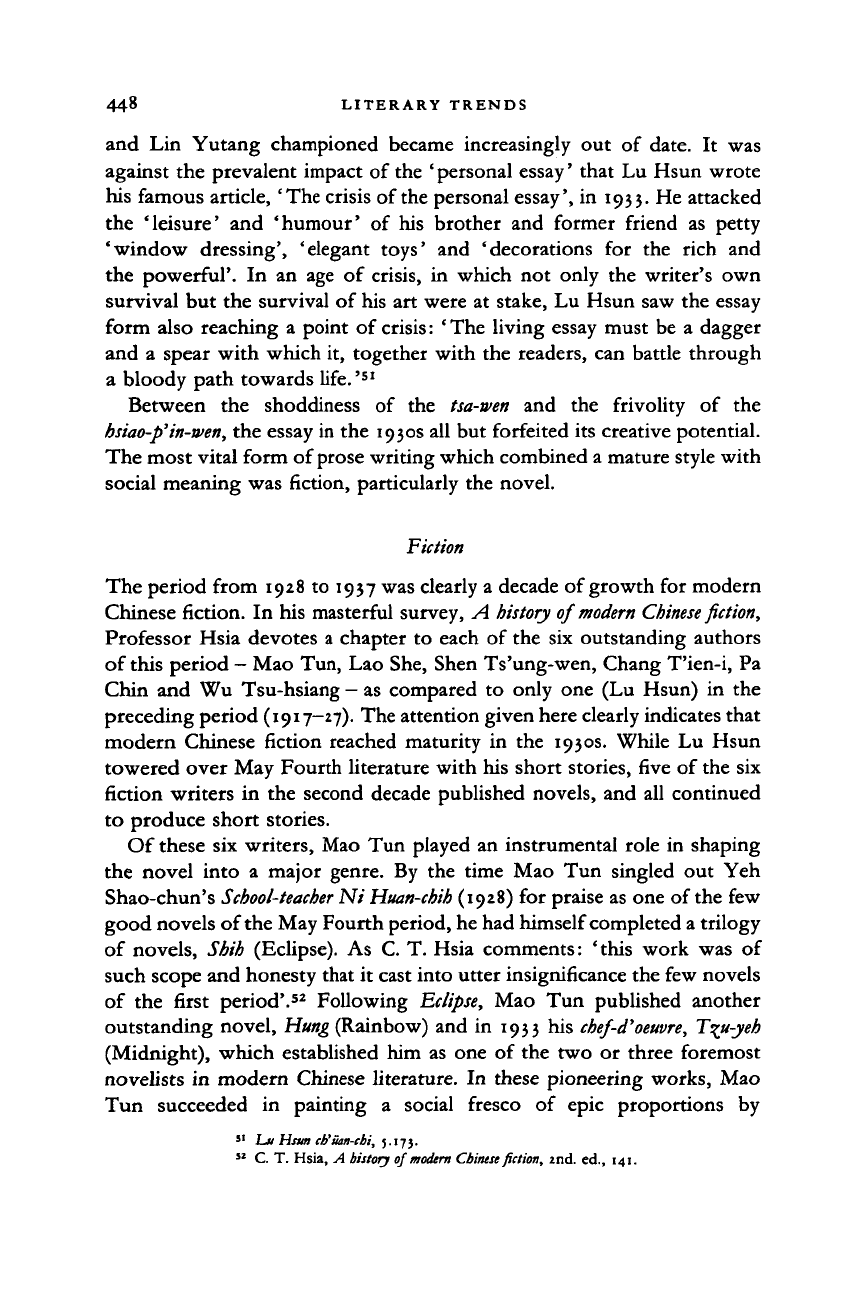
448 LITERARY TRENDS
and Lin Yutang championed became increasingly out of date. It was
against the prevalent impact of the
'
personal essay' that Lu Hsun wrote
his famous article, 'The crisis of the personal essay', in 1933. He attacked
the 'leisure' and 'humour' of his brother and former friend as petty
'window dressing', 'elegant toys' and 'decorations for the rich and
the powerful'. In an age of crisis, in which not only the writer's own
survival but the survival of his art were at stake, Lu Hsun saw the essay
form also reaching a point of crisis: ' The living essay must be a dagger
and a spear with which it, together with the readers, can battle through
a bloody path towards life.'
51
Between the shoddiness of the tsa-wen and the frivolity of the
hsiao-p'in-wen,
the essay in the 1930s all but forfeited its creative potential.
The most vital form of prose writing which combined a mature style with
social meaning was fiction, particularly the novel.
Fiction
The period from 1928 to 1937 was clearly a decade of growth for modern
Chinese fiction. In his masterful survey, A.
history
of
modern Chinese
fiction,
Professor Hsia devotes a chapter to each of the six outstanding authors
of this period - Mao Tun, Lao She, Shen Ts'ung-wen, Chang T'ien-i, Pa
Chin and Wu Tsu-hsiang - as compared to only one (Lu Hsun) in the
preceding period (1917-27). The attention given here clearly indicates that
modern Chinese fiction reached maturity in the 1930s. While Lu Hsun
towered over May Fourth literature with his short stories, five of the six
fiction writers in the second decade published novels, and all continued
to produce short stories.
Of these six writers, Mao Tun played an instrumental role in shaping
the novel into a major genre. By the time Mao Tun singled out Yeh
Shao-chun's
School-teacher
Ni
Huan-chih
(1928) for praise as one of the few
good novels of the May Fourth period, he had himself completed a trilogy
of novels, Shih (Eclipse). As C. T. Hsia comments: 'this work was of
such scope and honesty that it cast into utter insignificance the few novels
of the first period'.
s2
Following Eclipse, Mao Tun published another
outstanding novel,
Hung
(Rainbow) and in 1933 his
chef-d'oeuvre,
T^u-yeh
(Midnight), which established him as one of the two or three foremost
novelists in modern Chinese literature. In these pioneering works, Mao
Tun succeeded in painting a social fresco of epic proportions by
51
JL» Hsun cb'mn-cbi, 5.173.
" C. T. Hsia, A history of
modern
Chinese fiction, 2nd. ed., 141.
Cambridge Histories Online © Cambridge University Press, 2008
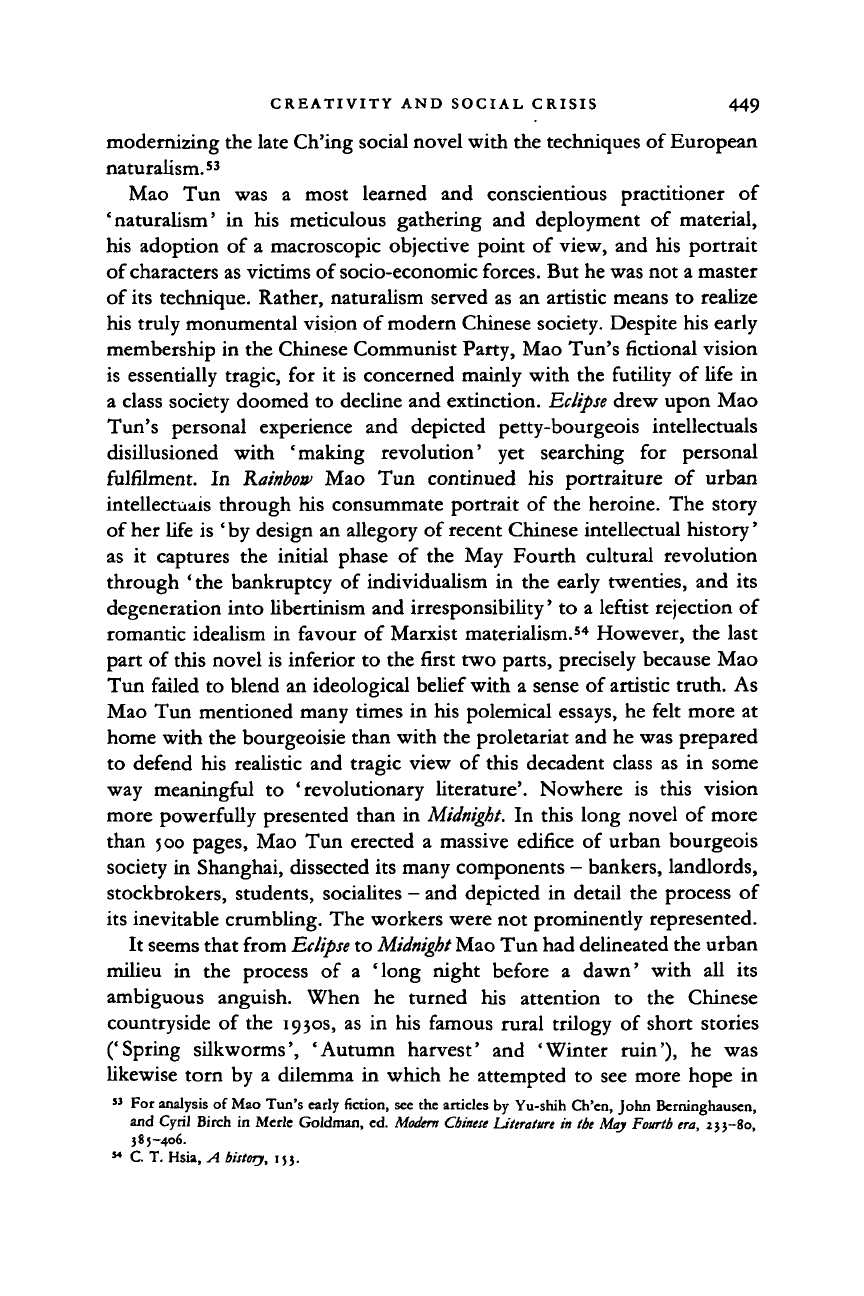
CREATIVITY AND SOCIAL CRISIS 449
modernizing the late Ch'ing social novel with the techniques
of
European
naturalism.
53
Mao
Tun was a
most learned
and
conscientious practitioner
of
'naturalism'
in his
meticulous gathering
and
deployment
of
material,
his adoption
of a
macroscopic objective point
of
view,
and his
portrait
of characters as victims
of
socio-economic forces. But he was not a master
of its technique. Rather, naturalism served
as an
artistic means
to
realize
his truly monumental vision
of
modern Chinese society. Despite his early
membership
in
the Chinese Communist Party, Mao Tun's fictional vision
is essentially tragic,
for it is
concerned mainly with
the
futility
of
life
in
a class society doomed
to
decline and extinction.
Eclipse
drew upon Mao
Tun's personal experience
and
depicted petty-bourgeois intellectuals
disillusioned with 'making revolution'
yet
searching
for
personal
fulfilment.
In
Rainbow
Mao Tun
continued
his
portraiture
of
urban
intellectuals through
his
consummate portrait
of
the heroine.
The
story
of her life
is
'
by design
an
allegory
of
recent Chinese intellectual history'
as
it
captures
the
initial phase
of the May
Fourth cultural revolution
through
'
the bankruptcy
of
individualism
in the
early twenties,
and its
degeneration into libertinism
and
irresponsibility'
to a
leftist rejection
of
romantic idealism
in
favour
of
Marxist materialism.
54
However,
the
last
part
of
this novel
is
inferior
to the
first two parts, precisely because Mao
Tun failed
to
blend
an
ideological belief with
a
sense
of
artistic truth.
As
Mao
Tun
mentioned many times
in his
polemical essays,
he
felt more
at
home with the bourgeoisie than with the proletariat and
he
was prepared
to defend
his
realistic
and
tragic view
of
this decadent class
as in
some
way meaningful
to
'revolutionary literature'. Nowhere
is
this vision
more powerfully presented than
in
Midnight.
In
this long novel
of
more
than
500
pages,
Mao Tun
erected
a
massive edifice
of
urban bourgeois
society
in
Shanghai, dissected
its
many components
-
bankers, landlords,
stockbrokers, students, socialites
-
and depicted
in
detail
the
process
of
its inevitable crumbling. The workers were
not
prominently represented.
It seems that from
Eclipse
to
Midnight
Mao Tun had delineated the urban
milieu
in the
process
of a
'long night before
a
dawn' with
all its
ambiguous anguish. When
he
turned
his
attention
to the
Chinese
countryside
of the
1930s,
as in his
famous rural trilogy
of
short stories
('Spring silkworms', 'Autumn harvest'
and
'Winter ruin'),
he was
likewise torn
by a
dilemma
in
which
he
attempted
to see
more hope
in
53
For analysis
of
Mao Tun's early fiction,
see
the articles
by
Yu-shih Ch'en, John Berninghausen,
and Cyril Birch
in
Merle Goldman,
ed.
Modern Chinese Literature
in
the
May
Fourth era, 233—80,
385-406.
"
C. T. HsU, A
history,
153.
Cambridge Histories Online © Cambridge University Press, 2008
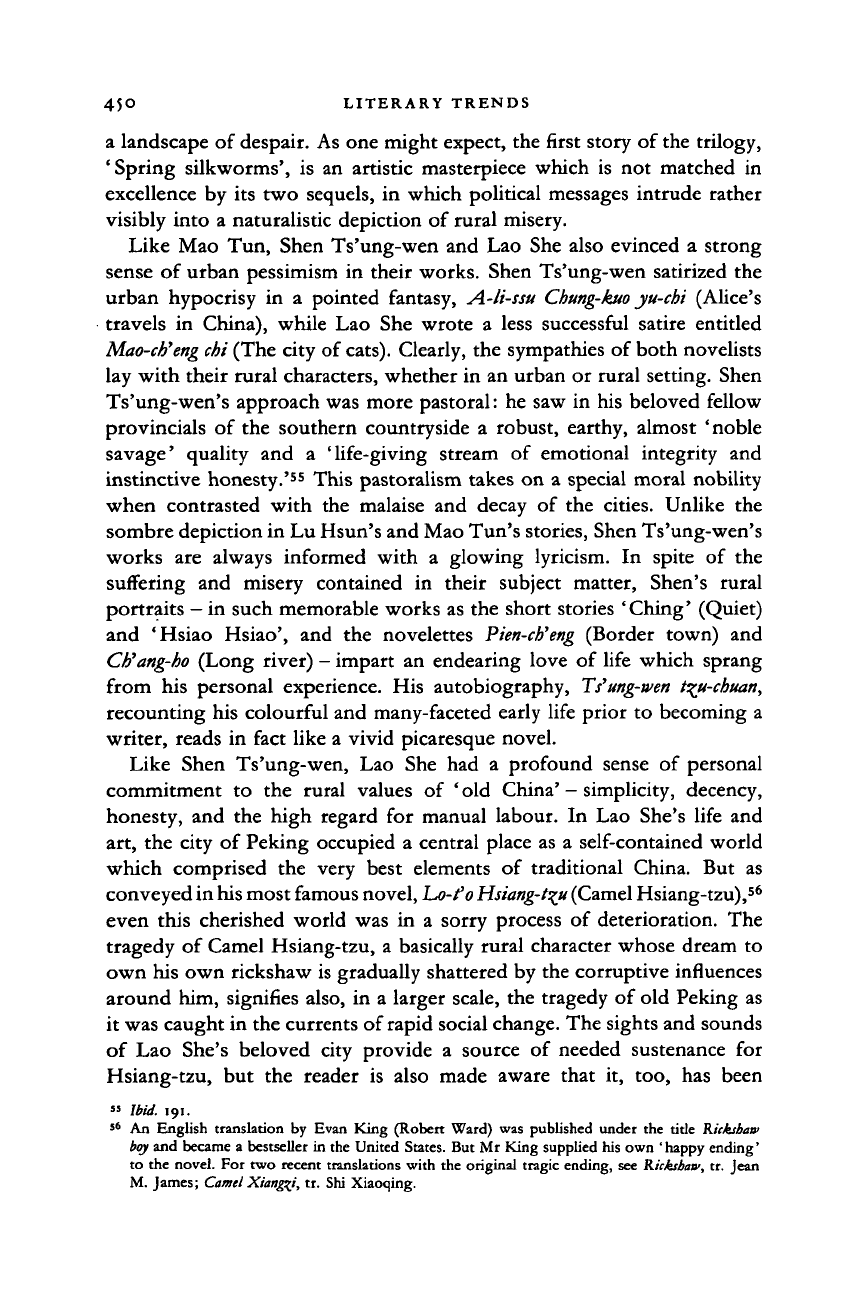
45° LITERARY TRENDS
a landscape of despair. As one might expect, the first story of the trilogy,
'Spring silkworms',
is
an artistic masterpiece which
is
not matched
in
excellence by its two sequels,
in
which political messages intrude rather
visibly into
a
naturalistic depiction of rural misery.
Like Mao Tun, Shen Ts'ung-wen and Lao She also evinced
a
strong
sense of urban pessimism in their works. Shen Ts'ung-wen satirized the
urban hypocrisy
in a
pointed fantasy, A-li-ssu
Chung-kuo
ju-chi (Alice's
travels
in
China), while Lao She wrote
a
less successful satire entitled
Mao-ch'eng chi
(The city of
cats).
Clearly, the sympathies of both novelists
lay with their rural characters, whether in an urban or rural setting. Shen
Ts'ung-wen's approach was more pastoral: he saw in his beloved fellow
provincials
of
the southern countryside
a
robust, earthy, almost 'noble
savage' quality
and a
'life-giving stream
of
emotional integrity
and
instinctive honesty.'
55
This pastoralism takes on
a
special moral nobility
when contrasted with the malaise and decay
of
the cities. Unlike
the
sombre depiction in Lu Hsun's and Mao Tun's stories, Shen Ts'ung-wen's
works
are
always informed with
a
glowing lyricism.
In
spite
of
the
suffering
and
misery contained
in
their subject matter, Shen's rural
portraits
-
in such memorable works as the short stories 'Ching' (Quiet)
and 'Hsiao Hsiao', and
the
novelettes
Pien-cb'eng
(Border town)
and
Cb'ang-ho
(Long river)
-
impart an endearing love
of
life which sprang
from his personal experience. His autobiography,
Ts'ung-wen
t%u-chuan,
recounting his colourful and many-faceted early life prior to becoming a
writer, reads in fact like a vivid picaresque novel.
Like Shen Ts'ung-wen, Lao She had
a
profound sense
of
personal
commitment
to the
rural values
of
' old China'
-
simplicity, decency,
honesty, and the high regard for manual labour.
In
Lao She's life and
art, the city of Peking occupied
a
central place as
a
self-contained world
which comprised
the
very best elements
of
traditional China. But
as
conveyed in
his
most famous novel, Lo-fo
Hsiang-hyt
(Camel Hsiang-tzu),
56
even this cherished world was
in a
sorry process
of
deterioration. The
tragedy of Camel Hsiang-tzu,
a
basically rural character whose dream
to
own his own rickshaw is gradually shattered by the corruptive influences
around him, signifies also, in a larger scale, the tragedy of old Peking as
it was caught in the currents of rapid social change. The sights and sounds
of Lao She's beloved city provide
a
source
of
needed sustenance
for
Hsiang-tzu,
but the
reader
is
also made aware that
it,
too, has been
"
Ibid.
191.
56
An English translation
by
Evan King (Robert Ward) was published under the title Kickshaw
bay
and became a bestseller in the United States. But Mr King supplied his own 'happy ending'
to the novel. For two recent translations with the original tragic ending, see
Rickshaw,
tr. Jean
M. James;
Camel
Xianggi,
tr. Shi Xiaoqing.
Cambridge Histories Online © Cambridge University Press, 2008
